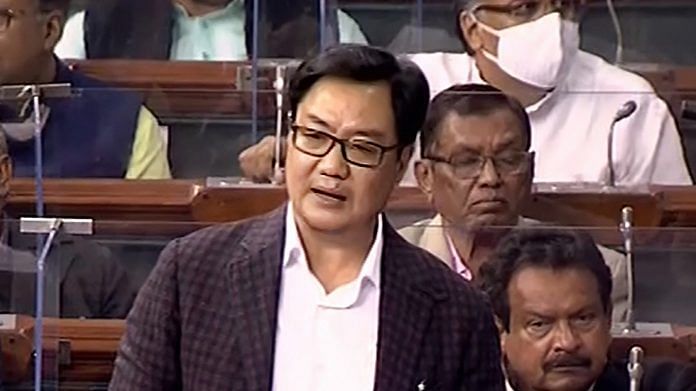New Delhi: Union Law Minister Kiren Rijiju Wednesday expressed reservations over a Supreme Court judgment delivered in April this year that prescribed a timeline for the central government to make appointments to high courts.
Referring to the judgment delivered by a bench headed by then-Chief Justice of India S.A. Bobde (now retired) and justices Sanjay Kishan Kaul and Surya Kant, Rijiju said the verdict introduced a judicially mandated timeline for high court appointments, although there was no such provision set out in the Memorandum of Procedure (MoP) — a rulebook followed to process appointments to HCs and the Supreme Court.
Rijiju made the statement in the Lok Sabha while tabling The High Court and Supreme Court Judges (Salaries and Conditions of Service) Amendment Bill, 2021, which adds an explanatory clause to the original bill to clarify at what age a retired judge is entitled to receive pensionary benefits.
He was responding to questions raised over delayed appointments by opposition members, including Trinamool Congress leader Kalyan Banerjee, who Tuesday posed a specific query regarding a name cleared by the SC collegium for the Calcutta HC.
Rijiju refrained from answering Banerjee, but added: “It is not wise to stick to a timeline for a particular name of judges. It will not set the right precedent.”
On SC’s April verdict, Rijiju said the top court had, for the first time, fixed a deadline for judicial appointments. “MoP does not say anywhere that we have to appoint judges in a fixed number of days, it is not mentioned. In the Mahanadi case, which I have referred to, the court has for the first time said the appointments should be cleared in three to four weeks. Now it is a larger question, which is not part of the MoP, but if SC gives a direction then we have to take a call and that is why I am indulging the House.”
Rijiju added that one cannot question the government over how long a name can remain pending with it, since appointment process is a time-consuming one.
However, the minister assured the House that if any name is held back, then there are valid reasons for it.
‘Not challenging judiciary’
The three-judge bench’s verdict delivered in April had a judicially mandated timeline for appointments, underlining it was necessary to facilitate the larger cause of dispensation of justice. This was done to fill up the gaps in the MoP that does not fix a deadline for the government to complete its task of verification and notifying the appointments.
The judgment said the government should forward recommendations for HC appointments to the SC collegium within 18 weeks of receiving it from the HC collegium. The SC collegium has to clear all the names within four weeks, following which the Centre should notify the appointments. However, if the Centre chooses to send the names back, it has to do so with specific reasons. And, in case the collegium reiterates the names, the April verdict held the same should be appointed within three to four weeks.
Without dwelling much on the April verdict, Rijiju said he was not challenging the judiciary, but would like the Parliament to look into the provisions of the Constitution, given that the judgment had introduced something that is not part of the MoP.
Dismissing allegations that Centre interferes with judicial appointments and transfer, Rijiju said the SC collegium is responsible for making selection of judges. At the same time, however, the government, he added, cannot be a mute spectator and has to perform its task of conducting a thorough background check of the candidates diligently.
He delved a bit on the evolution of the collegium system, which was introduced through two judicial pronouncements by the Supreme Court. Prior to the two rulings, he informed the House, the government had primacy over appointments, but the judiciary was part of the consultation process. This was in accordance with the Constitution.
He claimed that prior to 1993, when the collegium system became effective, some “good judges” were appointed to higher judiciary. “This all of us know,” the minister added, while reading out some names.
Rijiju explained it was impossible to have 100 percent working strength in high courts and that some seats will always remain vacant.
“Right now, I can definitely say that the appointment process is going on smoothly, from the government side there is no effort to scuttle or create any kind of slowdown (of the appointment process). It is not correct to say that the government is stopping names (sent by the collegium),’ Rijiju told the House.
(Edited by Shreyas Sharma)
Also read: 164 high court proposals to appoint judges at various stages of consideration: Kiren Rijiju



